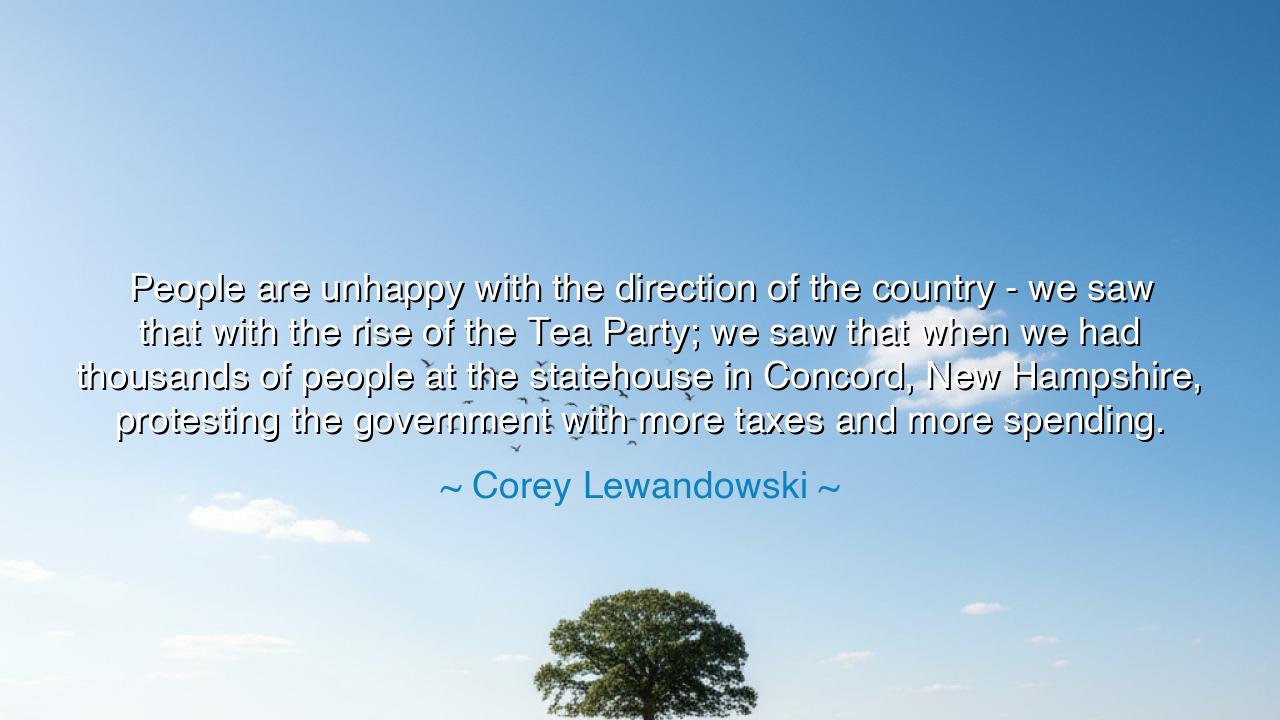
People are unhappy with the direction of the country - we saw
People are unhappy with the direction of the country - we saw that with the rise of the Tea Party; we saw that when we had thousands of people at the statehouse in Concord, New Hampshire, protesting the government with more taxes and more spending.






"People are unhappy with the direction of the country - we saw that with the rise of the Tea Party; we saw that when we had thousands of people at the statehouse in Concord, New Hampshire, protesting the government with more taxes and more spending." – Corey Lewandowski
In this fiery declaration, Corey Lewandowski captures the spirit of rebellion that stirs when a people feel estranged from their rulers. His words echo an ancient and recurring truth: that when government grows deaf to the cries of its citizens, the governed rise to make their voices thunder once again. The “unhappiness with the direction of the country” he speaks of is no passing complaint—it is the restless murmur of free men and women who sense that their nation is straying from its founding compass. For when a government demands more from its people—more taxes, more spending, more obedience—but gives less in justice, transparency, and trust, then the old fire of liberty is rekindled.
The Tea Party movement, born in the years following the financial crisis of 2008, was more than a protest; it was a modern echo of the same spirit that once threw tea into Boston Harbor. Citizens—farmers, workers, small business owners, and veterans—gathered not in secret, but in the open, to demand restraint, accountability, and a return to first principles. The statehouse in Concord, New Hampshire, became a symbolic ground of this discontent. There, thousands stood shoulder to shoulder beneath flags and winter skies, not to tear down their government, but to remind it of its purpose: that power exists to serve the people, not to burden them.
Throughout history, such uprisings of conscience have defined the fate of nations. In 1773, it was taxation without representation that ignited the first Tea Party—a revolt not against the idea of government, but against its corruption. In 1789, the French peasants rose when the weight of taxation crushed the poor while the nobles lived in opulence. In every age, the same pattern emerges: when the rulers forget that wealth and authority are borrowed from the governed, the people awaken to reclaim what is theirs. Lewandowski’s words stand as a reminder that democracy is not a permanent possession—it must be guarded by an active and watchful citizenry.
The emotion of protest is not born of hatred, but of love—love for one’s country and grief for its misdirection. When citizens take to the streets, waving banners and demanding justice, they are fulfilling the very duty upon which free societies depend: to hold leaders accountable. This was the essence of Concord’s protest, and of the Tea Party before it—a call to restore balance between liberty and governance, between the taxpayer and the state. Such moments of civil courage are not signs of chaos, but of life within a republic. For when people cease to speak, tyranny finds no resistance.
Yet, there is danger in both excess and apathy. Too much anger can consume a cause, turning righteous protest into blind rage. Too little, and the flame of liberty flickers out. The wise citizen, therefore, must learn the art of principled resistance—to protest without destruction, to demand change without abandoning unity. The great challenge of every generation is to balance passion with reason, and to ensure that the cry for reform does not become a cry for anarchy. Freedom, after all, is a delicate temple, built not by rebels alone, but by those who can govern themselves as well as their rulers.
Lewandowski’s words, though spoken in the context of modern America, carry an ancient resonance. They speak to the same human impulse that once moved Moses to defy Pharaoh, or the Romans to cast off kings, or the American colonists to stand against empire. They remind us that power, no matter how benevolent it begins, tends toward accumulation—and that only the vigilance of the governed can keep it in check. The people are not servants of the state; they are its soul, and when they speak, the halls of power must tremble.
The lesson, then, is clear: never grow silent when the direction of the nation veers from its promise. Speak with courage, gather with conviction, and remember that dissent is not disloyalty—it is the lifeblood of democracy. The citizens of every free land must remain alert to the creeping excesses of authority, for liberty dies not in one great blow, but in the quiet surrender of those who no longer care. Let the example of those in Concord, and of all who have stood for their beliefs, remind us that government is but a mirror of its people—and when the people awaken, the course of history can be changed.






AAdministratorAdministrator
Welcome, honored guests. Please leave a comment, we will respond soon